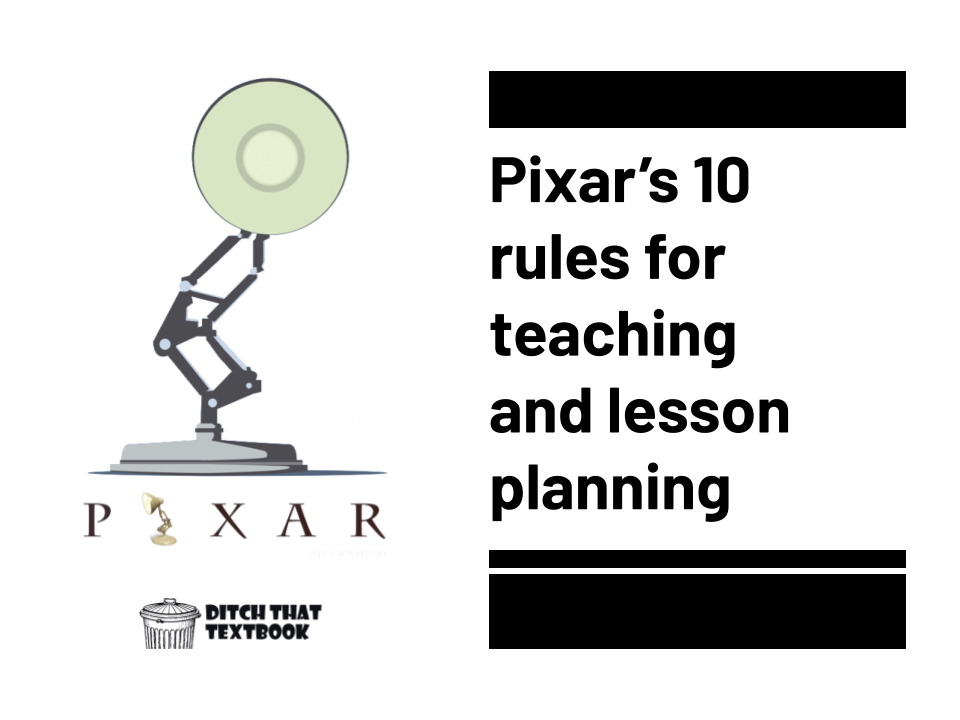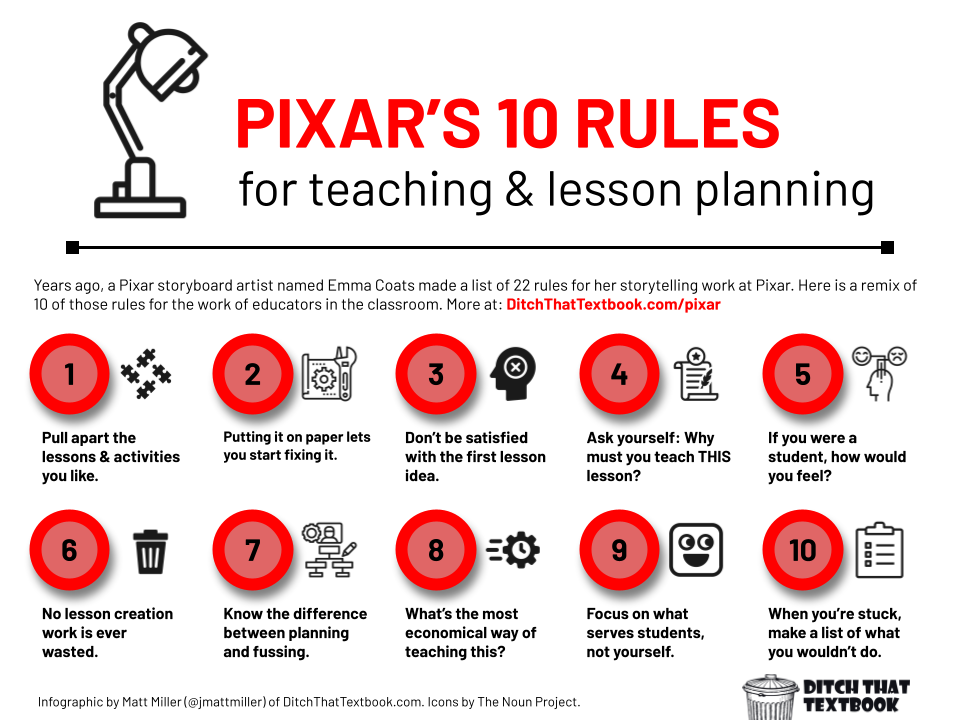
Looking for some creative rules for teaching? These Pixar storytelling rules can help us unlock our creativity in the classroom.
Pixar is one of the best at telling stories.
It started with the groundbreaking Toy Story, the first entirely computer-animated feature film. What followed are some of my favorite animated films -- and my children's favorites, too -- including Finding Nemo, The Incredibles, Monsters, Inc., and Up.
When a Pixar storyboard artist (and later writer/director) wrote her 22 rules for storytelling at Pixar, she had my attention.
Emma Coats posted her 22 "Storybasic" Rules for Storytelling on her Tumblr account and on Twitter years ago. (I stumbled upon them in this Twitter thread by writer Dickie Bush.)
She didn't write them for educators. But in many ways, she might as well have.
Teaching is strengthened by the elements of good storytelling. The best teachers know how to pique students' interest. They know when to pause for dramatic effect or to let students simply think. They know that the narrative is what we tell ourselves -- and how we tell it later. (And how we will remember it for a test!)
In this post, I'll borrow 10 of Emma Coats's rules for storytelling and apply them to teaching and lesson planning. You can find the original list of 22 -- and some commentary from Coats herself -- in this column from The Washington Post.


1. Pull apart the stories you like.
Educator version: Pull apart the lessons and activities you like.
When a lesson or activity goes well in the classroom, there are lots of reasons. Because we're busy people, we often don't take the time to put our finger on those reasons. If we'll just take a few moments, there are a few things we can do to capture the "lightning in a bottle" from great lessons and apply it to others:
- When that activity or class is over, stop for a moment and make notes in your lesson plans about what was successful and why. (Don't forget to revisit them next year!)
- As class is wrapping up -- or during class the next day -- ask students what they liked about the previous lesson and why.
- Find activities and lessons you loved from old lesson plans. Then remind yourself why you and your students loved them.

2. Putting it on paper lets you start fixing it.
Educator version: Putting lessons and activities on paper lets you start fixing them.
My favorite authors on the creative process are Steal Like an Artist author Austin Kleon and Atomic Habits author James Clear. Their advice is similar on this ...
Ideas aren't born perfect. You have to create something bad to make it better.
Lesson planning is a creative act. You're conjuring ideas out of the air and putting them into practice in the classroom. It's OK if it isn't great right away. (In fact, it's OK if it's garbage right away.)
Getting it on paper is the first step. Don't judge yourself there. That's just where it starts.

3. Discount the first thing that comes to mind.
Educator version: Don't be satisfied with the first lesson idea that comes to mind.
Many of us don't have hours and hours to plan and hone our very best lessons. Sometimes, it's just easier and faster if we get something down on paper and move on with a never-ending task list.
But maybe we don't need hours and hours. Maybe we just need an extra minute -- or even 30 seconds.
As you plan lessons, write down and remember the first thing that comes to mind. But let yourself sit with the idea for 60 seconds. Even 30 seconds.
Ask yourself: "How else could I do this?" Your next great lesson may come from it.

4. Why must you tell THIS story?
Educator version: Why must you teach THIS lesson?
Easy answer: Because I have to! Many times, we teach things because they're part of the curriculum and/or the academic standards.
But there's a reason they got there, right?
Remind yourself why your students need to learn this lesson and how it can shape them into the exceptional humans we need for a bright future. Even if you have no answer (or if the answer is uninspiring), ask: "What teachable moments are there in this?"

5. If you were a character, in this situation, how would you feel?
Educator version: If you were a student, in this situation, how would you feel?
Emma Coats likely used this to better understand what her characters should do next. So they felt authentic. So they felt real. "Honesty lends credibility to unbelievable situations," she wrote.
As you plan, try your best to see things through the student's eyes. (I know. this sounds like a worn-out cliche, but go with me ...)
- Where will they have been when they get to you? What will they have thought about? What will be weighing heavily on their mind?
- How much mental work (cognitive load) will they have dealt with? How much more will they realistically be able to handle?
- What's important to them? What do they like? What makes them laugh? How can we use that so their brain's filter (reticular activating system) doesn't shut the learning out?

6. No work is ever wasted.
Educator version: No lesson creation work is ever wasted.
At first, this one made me chuckle. Schools are bastions of inefficiency. We're asked to do things that don't lead to student learning but check the box for some ridiculous state mandate or required paperwork.
But when we get past all that dumb stuff, the work of planning lessons isn't wasted. (Or, at least, it doesn't have to be.)
We think we learn a lot from the things we do that work. But that's not always the case. The stuff that works just further confirms our pre-existing beliefs.
It's the stuff that doesn't work. That's what helps us evolve forward. When we wrestle through what doesn't work to find out what does, we learn something new that we can use in the future.
"If it's not working, let go and move on -- it'll come back around to be useful later," Coats wrote.
So don't be discouraged. (Or at least try not to be.)

7. You have to know yourself: the difference between doing your best and fussing.
Educator version: Know the difference between planning what's necessary for class and fussing.
From Dickie Bush's Twitter thread, where I found Emma Coats's 22 rules (his words, not Coats, I think) ...
"Too often, people get caught up in trying to plan every step from A to Z. And this 'planning' is really procrastination in disguise."
Ouch. This one hits close to home for me.
Searching 20 minutes for just the right picture. Scouring the internet for a better quote than the good one you already have. Fixing that bulletin board until it's just right.
Is it really making things better? Is it helping you do your best? Or is it just fussing?
Educators' time is precious. We have to be honest with ourselves and say, "That's good. I have other things to do."

8. What's the essence of your story? Most economical telling of it?
Educator version: What's the most economical way of teaching?
Have you heard of Occam's razor? It's a problem solving principle, often attributed to English Franciscan friar William of Ockham. It states that entities should not be multiplied beyond necessity.
Wikipedia sneers at what it calls an inaccurate paraphrase of Occam's razor that I actually like more.
"The simplest explanation is usually the best one."
As teachers, we love to make sure students have everything they need. So we give them every possibility. Snuff out every possible misconception. Equip them for every possible scenario.
This hurts us. Because at some point, they get bored and tune us out.
Brevity is power. It's memorable. Less is more. Find a more economical way to teaching something. Your students will thank you.
As Brad Pitt's character Rusty said in Ocean's Eleven: "Don't use seven words when four will do."

9. Keep in mind what's interesting to you as an audience, not what's fun to do as a writer.
Educator version: Focus on what serves your students, not what's fun for you as a teacher.
We have our things that we love as teachers. Thankfully, some of them are interesting to students and serve them, helping them to grow and learn.
Unfortunately, some of the things we love don't serve our students. They're fun to us. Sometimes, we see other teachers do them, and we think that makes them OK. But they don't serve our students.
When a teacher tells students about this funny story from college when the teacher learned this topic, overcame obstacles, and got praise from the professor, that's not serving the students. That's fun for the teacher. (Unless the story teaches them a lesson that could serve them.)
When the Spanish teacher went on and on about the interesting exceptions to traditional Spanish spelling rules because he was proud of himself for figuring it out, it didn't serve the students because that time could have been spent on more important things. (That Spanish teacher was me, by the way.)
This is a tricky one. And I don't want to sound harsh. This rule just reminded me that serving the students is more important than serving or entertaining ourselves.

10. When you're stuck, make a list of what WOULDN'T happen next.
Educator version: When you're stuck, make a list of what you WOULDN'T do.
This seems unintuitive. But it can really work. You can probably think of a list of things you DON'T want to do. It gets you started. Gets the words flowing.
When your hands remember what it feels like to generate good ideas, sometimes your mind falls into line.
Question: Which of these rules resonates most with you, and why? What are YOUR rules for teaching and lesson planning that you can add to the list? Add them in a comment below!
For notifications of new Ditch That Textbook content and helpful links:
- like Ditch That Textbook on Facebook
- follow @jmattmiller on Twitter
- check out the #DitchBook community on Twitter
- follow Ditch That Textbook on Pinterest
- subscribe to the Ditch That Textbook YouTube channel!
Interested in having Matt present at your event or school? Contact him by e-mail!
Is Matt presenting near you soon? Check out his upcoming live events!


Thaery much.
Thank yery much.
Thank very much.
Thank very much.
Thank you ver us .
Thank you verful for us .
Thank you very muelpful for us .
Thank you very much.
Blogfor us .
Thank you very much.
Bllpful for us .
Thank you very much.
Blog reful for us .
Blog really helpful for us .
Thank you very much.ful for us .
Thank you very much.
Blog rul for us .
Thank you very much.
Blog reaful for us .
Thank you vepful for us .
Thank you very much.
Blog
Thank you very much. helpful for us .
Thank you very much.pful for us .
Thank you very much.
Blog ul for us .
Thry much.
Blog really helpful for us .
Thank you very much.
Blog reul for us .
Thankou very much.
Blogful for us .
Thank you very much.
Blo helpful for us .
Thank you very much.
Blog reapful for us .
Your article is very useful
Thank you very much.
Thank you ever so for you article.
Merci pour ce partage
Mercicle très complet.
thank you
Merci poe très complet.
thank you
Merci pour cetle très complet.
thank you
o for you article.
Merci p ce partage
Thank for you article ce partage
Thao for you article.
Merci pour ce partage
Thank y for you article.
Mere partage
To for you article.
Merci pour ce
Thank so for you article.
Merci
Oh my goodness! an amazing article. Great work.
Thank yoeal helpful. I learnt a lot from it.
Oh my goodness! an amazing article. Great work.
Thank youwas real helpful. I learnt a lot from it.
Oh my goodness! an amazing article. Great work.
Thank you so muchreal helpful. I learnt a lot from it.
Thanko for you article.
Merci pour ce partage
Tha for you article.
Merci pour ce partage
Thanko for you article.
Merci pour ce partage
Thanks a lot for sharing!
best custom writing website
Thanks a lot for sharing!
best custom writing website
Thanks a lot for sharing!
best custom writing website
Your article is very useful
Thanks a lot for sharing!
Your article is very useful
Thanks a lot for sharing!
Your article is very useful
Thanks a lot for sharing!
Your article is very useful
Merci pour cet article très complet.
Your article is very useful
Merci pour cet article très complet.
Your article is very useful
Merci pour cet article très complet.
Than for you article.
Merci pour ce partage
Thank you you article.
Merci pour ce partage
Tr so for you article.
Merci pour ce partage
Thaver so for you article.
Merci pour ce partage
Thar so for you article.
Merci pour ce partage
Thank r so for you article.
Merci pour ce partage
o for you article.
Merci pour ce partage
Thaer so for you article.
Merci pour ce partage
T so for you article.
Merci pour ce partage
Thank for you article.
Merci pour ce partage
Thank for you article.
Merci pour ce partage
Thaver so for you article.
Merci pour ce partage
Thankso for you article.
Merci pour ce partage
Thank you ev you article.
Merci pour ce partage
Thr so for you article.
Merci pour ce partage
Thank o for you article.
Merci pour ce partage
Thank you everr you article.
Merci pour ce partage
Thank you ever so for you article.
Merci pour ce partage
Thank you efor you article.
Your article is very useful
Thank you eo for you article.
Your article is very useful
Thank you er so for you article.
Your article is very useful
Merci pourle très complet.
thank you
Merci pourcle très complet.
thank you
Merci pour cele très complet.
thank you
Merci pour ce partage
Thank you er you article.
Merci pour ce partage
Thank you ever so fo
Merci pour ce partage
Thank er so for you article.
besiting website
Thanks a lot for sharing!
best custom writing website
Thanks a lot for sharing!
best riting website
Thanks a lot for sharing!
Merci pour ce partage
Beautcle, Thank you!
Merci pour ce partage
Beaue, Thank you!
Merci pour ce partage
Beautiful , Thank you!
Nice topic.
Merci pour ce partage
Nice topic. Thank you
Merci pour ce partage
Nice topic. Thank you
Merci pour ce partage
Merci pe très complet.
thank you
Merci porès complet.
thank you
Merci pocle très complet.
thank you
Merci pour tout travail
Thank this. Beautiful articil
Merci pour tout travail
Thankg this. Beautiful articil
Merci pour tout travail
Thank you so m. Beautiful articil
Thank yoing this. Beautiful articil
Merci pour ce partage
Thank you s. Beautiful articil
Merci pour ce partage
Than. Beautiful articil
Merci pour ce partage
Merci pour tout travail
Thais. Beautiful articil
Merci pour tout travail
Thank you so much for
Merci pour tout travail
Thank you so much for
Merci
Thanks a lot for
Merci pour ce partage
Thanks a lot
Merci pour ce partage
Thanks a lot fo
Merci pour ce partage
Thanks a lot for
Merci pour ce partage
Thanks a lot for
Merci pour ce partage
Thanks a lot for !
Merci pour ce partage
Thanks a lot for sharing!
Merci pour ce partage
Thanks a lot for sharing!
Merci pour ce partage
Thanks a lot for sharing!
Thank you ever so for you ar
Merci pour ce partage
Thank you ever so for you article.
.
Merci pour ce partage
Thank you ever so for you articl
Merci pour ce partage
Merci pour ce partage
Thank you ever so for you article.
Merci pour ce partage
Thank you ever so for you article.
Merci pour ce partage
Thank you ever so for you article.
Thank you ever so for you article.
very much.
Thank you ever so for you article.
very much.
Thank you ever so for you article.
very much.
very much.
Nice topic. Thank you
Merci pour ce partage
very much.
Nice topic. Thank you
Merci pour ce partage
very much.
Nice topic. Thank you
Merci pour ce partage
Thank you ever.
Your article is very useful
very much.
Thank you ever.
Your article is very useful
very much.
Thank you
Your article is very useful
very much.
Thank you ever so for you article.
Your article is very useful
very much.
Thank you ever so for you article.
Your article is very useful
very much.
Thank you ever so for you article.
Your article is very useful
very much.
Blog really helpful for us .Thank you very much.
Merci pour cet article très complet.
Blog really helpful for us .Thank you very much.
Merci pour cet article très complet.
Much thanks again.
Your article is very useful
best custom writing website
Much thanks again.
Your article is very useful
best custom writing website
Much thanks again.
Your article is very useful
best custom writing website
Merci pour tout travail
Thank you so much for writing this. Beautiful articil
Merci pour tout travail
Thank you so much for writing this. Beautiful articil
thank you
very much.
Merci pour cet article très complet.
thank you
very much.
Merci pour cet article très complet.
thank you
very much.
Merci pour cet article très complet.
Blog really helpful for us .Thank you very much.
great information;
Merci pour cet article très complet.
Blog really helpful for us .Thank you very much.
great information;
Merci pour cet article très complet.
Blog really helpful for us .Thank you very much.
great information;
Merci pour cet article très complet.
Merci pour cet article très complet.
thank you
Merci pour cet article très complet.
thank you
Merci pour cet article très complet.
thank you
Thank you so much for writing this. Beautiful articil
Merci pour tout travail
Thank you so much for writing this. Beautiful articil
Merci pour tout travail
Thank you so much for writing this. Beautiful articil
Merci pour tout travailThank you so much for writing this. Beautiful artici
Merci pour tout travail
Thank you so much for writing this. Beautiful articil
great information;
Merci pour tout travail
Thank you so much for writing this. Beautiful articil
great information;
great information;
Merci pour cet article.
thank you
great information;
Merci pour cet article
thank you
great information;
Merci pour cet
thank you
Thank you so much for writing this. Beautiful articil
Merci pour ce partage et ce travail.beautiful articile.
Thank you so much for writing this. Beautiful articil
Merci pour ce partage et ce travail.beautiful articile.
Thank you so much for writing this. Beautiful articil
Merci pour ce partage et ce travail.beautiful articile.
best custom writing website
Thank you ever so for you article.
Much thanks again.
best custom writing website
Thank you ever so for you article.
Much thanks again.
Merci pour ce partage
Nice topic. Thank you
great information;
Merci pour ce partage
Nice topic. Thank you
great information;
Merci pour ce partage
Nice topic. Thank you
great information;
Thank you ever so for you article.
Much thanks again.
Your article is very useful
Thank you ever so for you article.
Much thanks again.
Your article is very useful
Much thanks again.
Thank you ever so for you article.
Your article is very useful
Much thanks again.
Thank you ever so for you article.
Your article is very useful
great information;
Merci pour cet article très complet.
thank you
great information;
Merci pour cet article très complet.
thank you
great information;
Merci pour cet article très complet.
thank you
I really resonated with the one about doing your best compared to fussing. I definitely need to be more discerning with what I spend time on. Thank you for that.
Thank you for this wonderful blog I thought it was very useful because I am a future upcoming teacher and that when I saw this I thought it was very appealing and caught my interest. This blog will be very beneficial in the future for thank you!
Merci pour tout travail
Hi thanks for the helpful information shared. the article is really very helpful.
Merci pour tout travail
Hi thanks for the helpful information shared. the article is really very helpful.
Merci pour tout travail
Hi thanks for the helpful information shared. the article is really very helpful.
This is a neat planning guide. So often I find myself asking why I’m doing something. Why is this assignment important? Always what should students get out of it? The of course, what’s the best way to teach it?